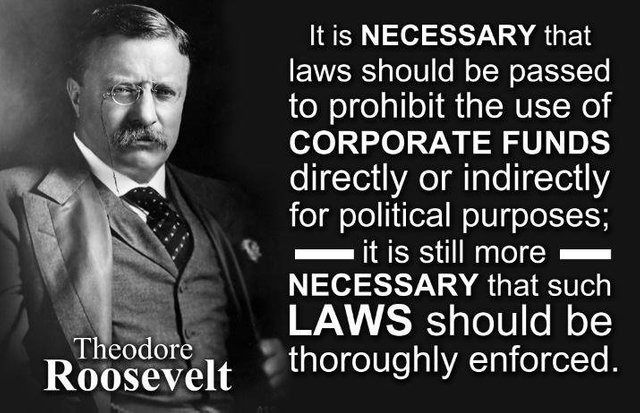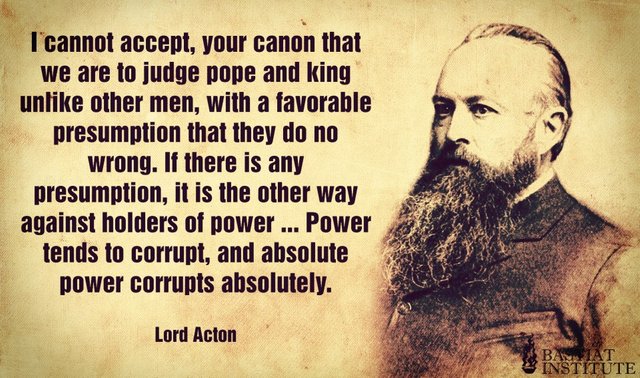Towards Voluntaryism (Part 19)
3.2. Government: Proposed Legislation for Constraints on Public Servants
Towards Voluntaryism (Part 19)
Proposed Legislation for Constraints on Public Servants
The following proposed legislation is intended to ensure that private monies do not unduly influence public servants and seeks to limit the ability of public servants to abuse their positions to personally profit from them.
The goal overall is to strictly limit all public servants to the income stream that is drawn from their salary as a public servant. In instances where the public servant also has a job or position in the private economy that provides them with income, the execution of their duties as a public servant must be strictly defined so as to ensure they do not unjustly advantage any party over competitors. Conflicts of interest must be accompanied by recusal or complete divestment of present and future interest.
To those ends, I propose the following:
Article 1: Constraints upon the legislative, executive and judicial branches of government, understood as public servants and employees, elected or appointed as well as contenders to public office (hereafter 'public servant') and their financial interaction with private business interests and individuals.
§1.1. It is forbidden for any public servants or their office to receive gifts, financial compensation or support for the execution of their duties as a public servant, either directly or indirectly, from any non-governmental or foreign governmental entities, their employees, representatives or proxies acting on their behalf. It is forbidden for any public servant to receive financial compensation or support, either directly or indirectly, from any private individual or proxy thereof who has a vested financial interest in how the public servant executes or is to execute their duties in office.
§1.2. It is forbidden for any public servant to receive gifts or compensation requiring direct or indirect financial investment of any shape or form, or any non-tangible representation thereof (e.g. digital currency, digital tokens, electronic titles to property, etc.) from a private individual, corporate entity, its employees, representatives or proxies thereof who have a vested financial interest in how the public servant executes or is to execute their duties in office.
§1.3. Products produced or services provided by any business are considered a financial investment pursuant to §1.1 & §1.2, and cannot be gifted, loaned to, borrowed, won or sold-at-discount to any public servant in exchange for the performance or non-performance of their servant duties. It is forbidden for public servants to accept free or sold-at-discount food, drinks or entertainment by any lobbying instance that stands to benefit directly or indirectly from any action the public servant may perform in the course of their official duties. This shall not constitute a restriction of the public servants' rights to purchase, own or use any product, service or property that public servants pay for with their own resources.
§1.4. It is forbidden for any public servant's family or friends to receive financial support, either directly or indirectly, from any private business entity, its employees, representatives or proxies acting on its behalf with the intent to directly or indirectly influence any public servant in the execution of their public duties.
§1.5. Transgressions of the constraints listed in ACA §1.1-§1.4 by a public servant or their family or friends and/or the intentional or willful subversion of these constraints as written and intended by this legislation will result in said public servant being charged with the offenses of bribery, conspiracy, malfeasance in office, perjury, unjust enrichment and perverting the course of justice for each instance as well as any other applicable laws dealing with corruption in public office.
§1.6. Should any transgressions of §1.5 be proven in a court of law shall result in the immediate removal of the guilty party from office with no severance pay or retirement benefits from their position in the government, a permanent ban from holding public office either elected or appointed, and a permanent ban from any paid or advisory position for any group that interacts with or receives funds from any government instance, agency or organization. Any group or individual seeking to employ or employing former said public servant for the purpose of lobbying, either domestically or abroad, shall be barred from operating or selling products or providing services within the relevant jurisdiction.
§1.7. Any laws, policies or actions affecting governmental regulation of private corporate entities or individuals enacted as a result of corruption as detailed in ACA §1.1-§1.4 shall be considered null and void. This provision is retroactively effective(precedent of retroactive application/change of the law).
§1.8. Any laws, policies or actions affecting governmental regulation of private corporate entities or individuals enacted by public servants shall not deprive any individual of their rights as guaranteed by the Constitution of the United States or the Bill of Rights, nor shall any legislation or regulation be enacted that intends to advantage any group or individual over any other group or individual that directly or indirectly imposes disadvantages on any party.
§1.9. Any public servant who holds stake in or exercises influence over the operations of any private business that can benefit from their role as a public servant shall not be allowed to vote or exercise their authority over any laws, rules or regulations that affect that business, in all such instances they are to be recused. In such case, a proxy public servant must be temporarily provided.
§1.10. If circumstances do not allow the public servant's action to not influence the private business or interest over which the public servant holds sway §1.9., the public servant shall be required to permanently divest themselves of any stake or interest in, financial or material, direct or derived from, the private business before they are permitted to exercise any influence over it in their role as a public servant. Furthermore, the public servant after their term in office shall be forbidden from receiving any direct compensation from said private business, its employees, representatives or proxies operating on its behalf.
End Article 1
This is very much a working proposal and I welcome feedback. I am trying to find the correction formulation for the proposed legislation so that it can ultimately be introduced as a ballot measure. The following sections will further clarify interaction between public servants and private interests and how the legislation itself is to be enforced.
Next: [Towards Voluntaryism (Part 20) - Constraints on Lobbying by Private Interests]

.
.
.
Shot with a golden arrow,
Cupid Zero
.
I consider requests to write on a topic of your choice.
.
Don't forget to upvote, follow and resteem! Comments always appreciated.
.
.
.
.
.
.
.
.
.
.
.
.
.
If you aren't on Steemit, please consider supporting my work with a gift of:
Bitcoin: 1fruAGn9JcKqJJscreUpS2XurfLzksBe8
Litecoin: LQf19ExcdSFDjYj6NktRgzBnJ7NScVgikA
Ethereum: 0xEe3005b1D2D8963a85E1Ca4ff511acCd98A1E29D



Curated for #informationwar (by @wakeupnd)

Relevance: laws are for everyone
Our Purpose